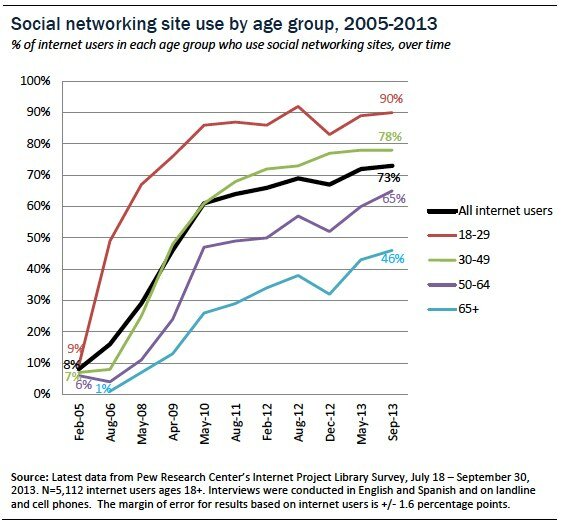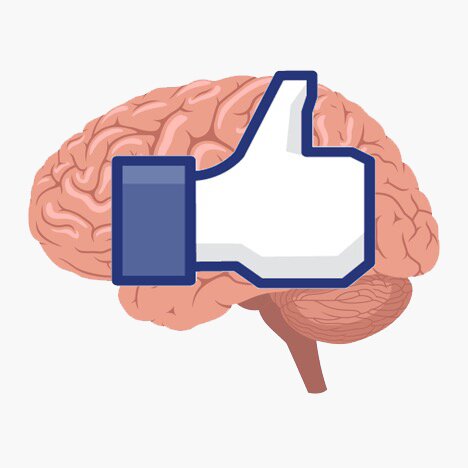What are the Negative Effects of Facebook?
- Depression
- Anxiety
- Self-esteem issues
- Potential for addictive patterns
- Productivity loss
- Relationship strain
- Social skill decline
Many people are concerned about the negative effects of Facebook due to its widespread use and influence. Issues like mental health struggles, addiction, self-esteem and body image issues, and relationship problems have sparked debates about the platform’s impact on individuals and society. This article will focus on evidence-based research to provide a clear understanding of the harms of Facebook.
- Facebook and Social Media Statistics
- Facebook: Mental Health Benefits and Consequences
- Social and Behavioral Consequences
- How Facebook Affects Us
Facebook: A Growing Phenomenon
Social media permits users to connect to one another - to participate in a social network that includes friends, other connections, invites, updates, events, status updates, etc.
Facebook, the eponymous social networking site, has created novel ways for users to communicate, but has this been a good thing?
In recent years there have been an abundance of studies conducted by mental health professionals that focus on Facebook and social media use. Some of the highlights of that research are presented here to help us think about the question: Is social media hurting or helping?
The use of Facebook and social media has grown tremendously over the past ten years. Most people who use the internet utilize social media.
- 95% of all teens (13-17 years of age) are online.
- 81% of online teens frequent some type of social media, up from 55% of online teens in 2006.1
- 77% of online teens use Facebook.2
- 74% of adult internet users use social media, compared to just 8% ten years ago.3

The time people spend on social media is substantial.
- An estimated 28% of all time online is spent on social networking.4
- 22% of teens log on to a social media site more than 10 times a day, and more than half of adolescents log on to a social media site more than once a day.5
- In 2014 Facebook estimated that the average user spends 8.3 hours a month on the site.6
Although there now are a number of social networking sites, Facebook continues to be the most popular.
Therapists are Standing By to Treat Your Depression, Anxiety or Other Mental Health Needs
Explore Your Options Today
Ad

Facebook: Mental Health Benefits and Consequences
In recent years, a number of researchers have explored possible connections between the use of Facebook as well as other social networking sites and mental health. The research to date has provided mixed results.
Benefits to Mental Health
A number of arguments have been made to suggest that Facebook can be beneficial to mental health:
Argued Benefits to Mental Health
- Social connections reduce depression and anxiety.
- Facebook and social media can be helpful for people suffering from social anxiety as they provide the opportunity to develop social relationships on-line without the stress that face-to-face interactions provoke.7
- Facebook connectedness is associated with lower depression and anxiety and greater satisfaction with life.8
- Facebook boasts numerous mutual support groups for people struggling with difficult circumstances; particularly useful for people who do not live in areas where meetings are scheduled or are more likely to participate in an online platform due to privacy concerns.
Consequences to Mental Health
Conversely, a number of studies emphasize the potentially negative consequences of sites like Facebook. They document the incidence of anxiety, depression, ADHD, eating disorders and addictions among users. Some of the major findings include:
Depression
- Cyberbullying increases risk of depression and anxiety in children.9
- Facebook can cause depression if the user makes negative comparisons between himself or herself and others.10
- Facebook use "predicts declines in subjective well-being: how people feel moment to moment and how satisfied they are with their lives."11
- Facebook can cause envy, which can lead to depression.12
ADHD
- Social media can increase symptoms of ADHD.13
Eating Disorders
- Body exposure on Facebook can lead to eating disorders.
- The incidence of body image disturbance among adolescent girls is associated with Facebook use.14
Addiction and Facebook
Can someone be addicted to Facebook? And, if so, what relationship might it have to alcohol use and substance abuse disorders? The Diagnostic and Statistical Manual of Mental Disorders (DSM) does not include Facebook or social media use under addiction-related disorders. However, a number of researchers have conducted studies that suggest it might be considered as an addiction. Highlights from this research include:
Connection to Addiction
- "Internet addiction causes neurological complications, psychological disturbances and social problems."15
- The Bergen Facebook Addiction Scale has been developed to measure addiction to Facebook.
- Excessive Facebook use correlated with elements of addiction as well as neuroticism.16
- Nearly 10% of users display disordered social networking use.17
Excessive Facebook use can be detrimental to both a person's health and their social relationships. Individuals who delay or disrupt their sleep to engage with others on Facebook may not get the rest they need. A lack of sleep can provoke malaise, but it also can result in behavioral changes. The time spent social networking can detract from other social relationships or responsibilities. Couples, families, households and even workplace relationships can suffer when a person seems to be as excessively focused on Facebook as on the matter at hand.
Social and Behavioral Consequences
Compulsive Facebook use can have many social and behavioral consequences on a person’s relationships, social skills, and productivity.
Real-Life Relationships
Facebook significantly influences interpersonal dynamics and communication patterns among people of all ages. Evidence suggests that excessive Facebook use may lead to decreased face-to-face interaction and intimacy among people.[18]
Moreover, research shows that prolonged engagement with Facebook can result in feelings of loneliness and isolation.[19] Studies also show that the selective self-presentation encouraged by social media platforms like Facebook may distort perceptions of reality and lead to misunderstandings in interpersonal relationships.[20]
Distraction and Productivity
Research suggests that frequent use of Facebook during work or study hours can lead to distractions, reducing overall productivity.[21]
Another study found that constant notifications and the temptation to check updates on Facebook can interrupt tasks, leading to longer completion times and decreased efficiency.[22]
Moreover, studies have found a negative correlation between excessive Facebook use and academic performance among students.[23] Spending significant time on Facebook can reduce study hours and concentration levels, ultimately affecting grades and overall academic success.[24]
Social Skills Development
Compulsive Facebook use can have many detrimental effects on social skills development.
For example, studies suggest that prolonged use of virtual communication platforms can diminish empathy and decrease the quality of social connections.[25] When interactions are primarily mediated through screens, individuals may become desensitized to the emotions of others, resulting in shallow or superficial relationships.
Relying heavily on virtual interactions may also lead to a dependency on technology for socialization, reducing opportunities for face-to-face interactions.[26] Over time, this dependency can hinder the development of essential social skills, such as active listening, conflict resolution, and empathy.
Further, virtual interactions can exacerbate social anxiety for some individuals, as they may feel more comfortable communicating online than in face-to-face settings.[27] This reliance on virtual communication may perpetuate avoidance behaviors, making it challenging for individuals to engage in real-world social situations.
How Facebook Affects Us
Facebook and other social media sites invite people to engage with one another.
Facebook users can stay in touch with friends and loved ones they do not get to see as much as they would like, as well as opportunities to meet new people with whom they might have interests, concerns or experiences in common.
Such activities may contribute to an overall sense of connection and well-being. However, given the research on social media, it is evident that certain ways of using and experiencing Facebook are complex and potentially harmful.
The research warns of the mental health risks related to excessive Facebook use and the pursuit of Facebook activities as a means to compensate for a lack of meaningful connections offline. People seem to run into problems when their Facebook activities come to replace or distort other forms of social identity and interaction.
For the person who delights in sharing with others, an
absence or limited number of
"likes" or "views"
can be discouraging. If a person depends on those likes for validation and they are not forthcoming, or the posts are met with negative comments, the person might become anxious or depressed. The same could happen if they make a habit of
comparing their own posts' popularity to those of other people.
Facebook communication is limited to what you can see and do on a screen. That is, non-verbal cues such as the gestures and facial expressions that we enjoy and process in face-to-face conversations, as well as knowledge of who exactly the audience may be, are absent. Nor do the users have to attend to their own facial expressions or body language when on Facebook. They can carefully - or not so carefully - craft the image of themselves they wish to portray. They can also carry on several conversations with different people simultaneously if they so desire.
Facebook is not the same as face-to-face interaction; distinct sets of communicative norms and expectations apply to each. Facebook cannot replace other forms of communication or meaningful social relationships.
Facebook and mental health: Hurting or helping? Yes...depending on how it's used.
Resources
- Lenhart, Anne et. al. Pew Research Center, 2010. Social Media and Mobile Internet Use among Teens and Young Adults. Available at: http://www.pewinternet.org/files/old-media/Files/Reports/2010/PIP_Social_Media_and_Young_Adults_Report_Final_with_toplines.pdf
- Pew Research Center, 2015. Teens Fact Sheet. Available at: http://www.pewinternet.org/fact-sheets/teens-fact-sheet/
- Pew Research Center. 2014. Social Networking fact Sheet. Available at: http://www.pewinternet.org/fact-sheets/social-networking-fact-sheet/
Social Media Use over Time. Available at: http://www.pewinternet.org/data-trend/social-media/social-media-use-all-users/
- Globalwebindex. 2015. Available at: http://www.globalwebindex.net/blog/daily-time-spent-on-social-networks-rises-to-1-72-hours
- Common Sense Media. Is Technology Networking Changing Childhood? A National Poll. San Francisco, CA: Common Sense Media, 2009. Available at: https://www.commonsensemedia.org/about-us/press-releases/is-social-networking-changing-childhood
- Facebook 2015. Facebook's Growth and Revenue. Available at: https://www.facebook.com/media/set/?set=a.646751542002797.1073741848.595941147083837&type=3
- Young CMY, Lo BCY. Cognitive appraisal mediating relationship between social anxiety and internet communication and adolescents. Personality and Individual Differences. 2012(52):78â€"83.
- Grieve, Rachel, et. al. Face-to-Face or Facebook: Can social connectedness be derived online? Computers in Human Behavior, Volume 29(3) 604-609.
- Schurgin O'Keeffe, Gwenn, et. al. 2011. Clinical Report: The Impact of Social Media on Children, Adolescents and Families. Pediatrics, DOI: 10.1542/peds.2011-0054. Available at: http://pediatrics.aappublications.org/content/pediatrics/early/2011/03/28/peds.2011-0054.full.pdf
- Steers, Mai Ly N. et. al. 2014. Seeing Everyone Else's Highlight Reels: How Facebook Usage is Linked to Depressive Symptoms. Journal of Social and Clinical Psychology 2014 33 (8), 701-731. Available at: http://guilfordjournals.com/doi/abs/10.1521/jscp.2014.33.8.701
- Kross E, et al. (2013. Facebook Use Predicts Declines in Subjective Well-Being in Young Adults. Available at: http://journals.plos.org/plosone/article?id=10.1371/journal.pone.0069841#s5
- Edson C. Tandoc, et. al. 2015. Facebook use, envy, and depression among college students: Is facebooking depressing? Computers in Human Behavior, 2015; 43: 139 DOI:10.1016/j.chb.2014.10.053
- Ela Malkovsky, et. al., 2012.Exploring the relationship between boredom and sustained attention. Experimental Brain Research Volume 221 (1): 59-67.
- Meier Evelyn P. and Gray James. 2014. Facebook Photo Activity Associated with Body Image Disturbance in Adolescent Girls. Cyberpsychology, Behavior, and Social Networking. April 2014, 17(4): 199-206. doi:10.1089/cyber.2013.0305.
- Cash, Hilarie, et. al., 2012. Internet Addiction: A Brief Summary of Research and Practice. Current Psychiatry Reviews, volume 8(4): 292-298. Available at: http://www.ncbi.nlm.nih.gov/pmc/articles/PMC3480687/
-
Andreessen CS1, Torstein T, Bromberg GS, Palliser S. 2012. Development of a Facebook Addiction Scale. Psychological Reports 110(2):501-17.
- Hormes, Julia, et. al. 2014. Craving Facebook? Behavioral addiction to online social networking and its association with emotion regulation deficits. Addiction. 2014 Dec;109(12):2079-88. doi: 10.1111/add.12713.
-
Vogel, E. A., Rose, J.P., Oldie, B.M., Eckles, K., & Franz, B. (2015). Who compares and despairs? The effect of social comparison orientation on social media use and its outcomes. Personality and Individual Differences, 86, 249-256.
-
Pantic, I., Damjanovic, A., Todorovic, J., Topalovic, D., Bojovic-Jovic, D., Ristic, S., & Pantic, S. (2012). Association between online social networking and depression in high school students: behavioral physiology viewpoint. Psychiatria Danubina, 24(1), 90–93.
-
Toma, C. L., & Hancock, J. T. (2013). Self-affirmation underlies Facebook use. Personality and Social Psychology Bulletin, 39(3), 321–331. https://doi.org/10.1177/0146167212474694
-
Ahmad, M.B., Hussain, A. & Ahmad, F. The use of social media at work place and its influence on the productivity of the employees in the era of COVID-19. SN Bus Econ 2, 156 (2022). https://doi.org/10.1007/s43546-022-00335-x
-
Rosen, L. D., Whaling, K., Rab, S., Carrier, L. M., & Cheever, N. A. (2013). Is Facebook creating ‘‘iDisorders’’? The link between clinical symptoms of psychiatric disorders and technology use, attitudes and anxiety. Computers in Human Behavior, 29(3), 1243–1254. https://doi.org/10.1016/j.chb.2012.11.012
-
Junco, R. (2012). Too much face and not enough books: The relationship between multiple indices of Facebook use and academic performance. Computers in Human Behavior, 28(1), 187–198. https://doi.org/10.1016/j.chb.2011.08.026
-
Kirschner, P. A., & Karpinski, A. C. (2010). Facebook® and academic performance. Computers in Human Behavior, 26(6), 1237–1245. https://doi.org/10.1016/j.chb.2010.03.024
-
Konrath, S. H., O'Brien, E. H., & Hsing, C. (2011). Changes in dispositional empathy in American college students over time: a meta-analysis. Personality and social psychology review : an official journal of the Society for Personality and Social Psychology, Inc, 15(2), 180–198. https://doi.org/10.1177/1088868310377395
-
McKenna, K. Y. A., & Bargh, J. A. (2000). Plan 9 From Cyberspace: The Implications of the Internet for Personality and Social Psychology. Personality and Social Psychology Review, 4(1), 57-75. https://doi.org/10.1207/S15327957PSPR0401_6
-
Caplan, S. E. (2003). Preference for online social interaction: A theory of problematic Internet use and psychosocial well-being. Communication Research, 30(6), 625–648. https://doi.org/10.1177/0093650203257842
-
As advocates of mental health and wellness, we take great pride in educating our readers on the various online therapy providers available. MentalHelp has partnered with several thought leaders in the mental health and wellness space, so we can help you make informed decisions on your wellness journey. MentalHelp may receive marketing compensation from these companies should you choose to use their services.
MentalHelp may receive marketing compensation from the above-listed companies should you choose to use their services.
Ad




